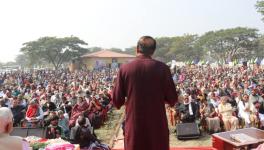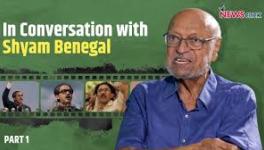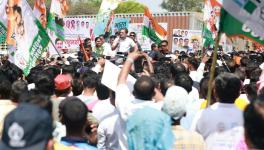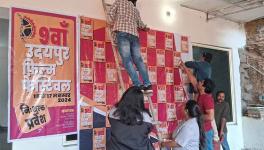How Gandhi’s Assassins Betrayed their Lovers
Journalist Dhirendra K Jha’s book, Gandhi’s Assassin: The Making of Nathuram Godse And His Idea of India, nails the lie the Rashtriya Swayamsevak Sangh spread over the decades—that Nathuram Godse left the organisation long before he pumped bullets into Mahatma Gandhi, on 30 January 1948. This important theme of the book is entwined with the tragic story about two women who loved two of the nine-member squad responsible for killing Gandhi.
The two women, from contrasting class backgrounds, loved their men yet were betrayed. They were to never rediscover love in their lives. It would seem the two women could never forgive themselves for falling in love with the men guilty of patricide, for they had, after all, played a role in killing the Father of the Nation.
One was an Ahmednagar-based sex worker’s daughter. She fell in love with Madanlal Pahwa, the 20-year-old refugee from Pakistan. The other was the daughter of a doctor. A Christian, she played the pipe organ in church. She was seduced by Narayan Apte, who, along with Godse, was hanged for killing Gandhi.
No two men could be so unlike each other as Apte and Godse, even though both were votaries of Hindtuva and conspired to kill Gandhi. Apte preferred trousers and sports shirts—and wore tweed jackets in winter. He smoked, loved his whiskey and was known to be a womaniser.
Godse’s everyday dress, by contrast, was the RSS uniform or dhoti. He shunned the company of women. Once he was taken to hospital in a semi-conscious state. When he revived, Godse was so horrified to see nurses in the ward that he wrapped a bedsheet around himself and ran out!
Manorma meets Apte
Born in 1913, Apte belonged to the educated middle class emerging then in India. After graduating from Pune’s prestigious Fergusson College in 1932, he was recruited by American Mission High School, in Ahmednagar, to teach mathematics. Manorma Salvi, daughter of a doctor posted at Shegaon, a nondescript town in Maharashtra, was to become his student a few years later. By then, Apte was married and had a son.
Apte took to corresponding with Vinayak Damodar Savarkar, already the high priest of the Hindu Right. He disclosed to Savarkar his idea of starting rifle clubs, for which Savarkar provided suggestions. In 1938, he established his first rifle club in Ahmednagar; three other branches were opened in Pune, Satara and Sholapur.
In 1941, his school sent him to Pune for an advanced teacher training programme. It was here he met Godse, their friendship a consequence of the ideology they shared. They together took to establishing the Hindu Rashtra Dal, a militant group teaching young men to handle guns. Soon, though, Apte joined the Royal Air Force, but he resigned in months, ostensibly because of the death of his elder brother who headed the family.
During his short stint with the Royal Air Force, he wrote letters to a select band of his students, among whom was Manorma Salvi, who was on the verge of matriculating. Out of the Air Force, Apte secured an appointment at Bhavi School, Pune. In July 1944, Manorma enrolled at Mumbai’s Wilson College, Mumbai, and lodged at Pandita Ramabai Girls Hostel.
Cupid Strikes Manorma
One day in July 1944, Apte appeared at Manorma’s s hostel. He took her and two of her friends to watch a film and then for a stroll down the Chowpatty sea shore. A week later, Apte was back. Would Manorma not come out for a late evening show, followed by dinner? The invitation was only for her. The game of seduction had begun.
No, Manorma said. But she agreed to have lunch with him. She returned to the hostel only in the evening, relieved he had not made a pass at her. But she was also attracted to Apte, for Jha writes she was transported to a “world of dreams.” Love, as is famously said, is part feelings and part imagination.
Their meetings now acquired a pattern. Apte would, now and then, take a train to Mumbai to spend time with her. Until their next meeting, they would write letters to each other, stoking the suspicion of the hostel warden. Apte took to writing to her under the pseudonym of Nirmala.
During the 1944 autumn break, letters from Apte kept pouring in. The Salvis did not suspect Manorma was romancing a man, for the person writing to her was Nirmala. She did not inquire from Apte about his marital status, perhaps thinking a married man would not show interest in a teenager. Their month-long separation deepened her ardour.
Back in Mumbai in November, swept away by her passion, certain her lover was committed to him, Manorma spent a night with Apte at Gujarat Niwas. A new pattern of love emerged. Apte would visit Mumbai to spend nights with Manorma, often at Aryan Pathik Ashram. In its register of guests, Apte would declare her as his wife.
He would also bring for Manorma a copy of Agrani, the newspaper Godse and he had floated in Pune. Their newspaper was abusive of Gandhi and fanned anger against religious minorities, particularly Muslims. Manorma disagreed with Agrani’s content, not surprising for a Christian. Yet her reaction did not dissuade Apte from bringing Agrani to her. This testifies to Apte’s confidence of his hold over her: She was too smitten by him to break the relationship over ideological differences.
Manorma meets Savarkar
In 1946, on her way to Shegaon, Manorma broke her journey for two days at Pune, where Apte was already deep into the violent world of Hindutva. The hotel in which Apte and Manorma shacked up, coincidently, had also Savarkar as its guest. He took her to meet Savarkar—and introduced her as his wife. This, to her, reflected his enduring commitment to her.
Manorma was not particularly pleased to meet the Hindutva ideologue, whom she blamed for turning Apte communal. Once Manorma had been critical of Savarkar in a letter to Apte, who had severely reprimanded her. She never brought up Savarkar with him. There was in her the Christian belief, Jha writes, that she could reform Apte who had, by late 1947, taken to speaking of burning down Muslim localities in Mumbai.
Shewanti finds love
By October 1947, Pahwa had found his way to Mumbai, where he became acquainted with Prof Jagdish Chandra Jain. Pahwa was then hawking books door-to-door. Dissatisfied, he thought of setting up a fruit-stall. For tapping a source of supply, Pahwa journeyed to Ahmednagar, where he met Vishnu Karkare, who was already a member of the squad that was to eventually assassinate Gandhi.
Karkare promised to set up a coconut shop for Pahwa in Ahmednagar. The refugee’s anger was tapped to organise Hindu for terrorising Muslims in the fruit trade and snatching away their business. Pahwa led from the front, even bombing fruit stalls owned by Muslims. A disempowered man, dislocated from his village, he enjoyed the sense of power he now commanded. This also had him become completely dependent on Karkare.
Pahwa had another reason to grow attached to Ahmednagar, for a friend of his had taken him to meet, on 25 December, a “singing girl”. Her name: Shewanti, the 19-year-old daughter of a sex worker. Shewanti had rebuffed her mother’s plea to join the sex trade, certain that one day a “man of her choice” would take her away to live a life of dignity.
On 25 December, Shewanti was not at home. Taken in by his friend’s description of her beauty, Pahwa went on his own, two days later, to meet Shewanti. They talked. They were in love. He bought her gifts. He told her about his involvement in the city’s violent activities.
Just as Manorma did not take to Apte’s mentor Savarkar, so did not Shewanti to Karkare. Jha, in October 2019, interviewed Sumanbai, an acquaintance of Shewanti from those years. According to Sumanbai, Shewanti once told Pahwa: “Don’t you realise that people respect you because they are afraid of you?”
Pahwa smiled at her.
He kept courting her. They went together to watch films. On 4 January he bought Shewanti a silk odhni and took her to a cinema theatre screening Chabukswar. On 5 January, Pahwa disrupted a political meeting, prompting the police to ask Karkare and Pahwa to leave Ahmednagar within 24 hours.
The duo began making preparations to leave for Pune. It was then Karkare told Pahwa about a secret plan to kill the Mahatma. But what Karkare withheld from Pahwa was the role he was required to play in assassinating Gandhi. The assassination squad, by then, was busy collecting weapons.
Providence schemed to give Shewanti yet another day with Pahwa, for before boarding the train on 6 January he got caught in a scuffle and sustained a minor head injury. Karkare left for Pune and asked Pahwa to join him two days later. Pahwa spent most of his time with Shewanti. Before leaving for Pune on 8 January, Pahwa gave her Prof Jain’s Mumbai address where she could send him letters.
From Pune, Pahwa went to Mumbai, where, on 14 January, before they were to take a night train to Delhi, Pahwa saw Karkare pack explosives in his holdall. Karkare fobbed off Pahwa’s questions with vague replies.
With a few hours to kill before the train’s scheduled departure at 9.30 pm, Pahwa went to Prof Jain’s residence. He told him about the squad’s plan to bump off Gandhi. The professor tried to persuade Pahwa to abandon the trip to Delhi, explaining to him the Hindu Right’s motive behind the gameplan to kill Gandhi. Since Pahwa’s leg-up in life depended on Karkare, he told Prof Jain that he would go to Delhi to meet relatives, withholding from him the information that the squad was also ferrying weapons there.
The betrayal
On arriving in Delhi, Pahwa had two days to kill, for the bid on Gandhi’s life was planned for 20 January. In those two days, Godse met his uncle and his wife. They told him about the girl his father, residing in Jalandhar, had identified for him to marry. She, too, lived in Delhi, with her brother, whose residence was near Pahwa’s hotel.
Taking money from Karkare, Pahwa bought Pathani sandals for his would-be wife—and went over to her brother’s residence. He met her mother, had tea with the family, and went with them to attend Jawaharlal Nehru’s public meeting.
In less than a week, Pahwa had forgotten Shewanti.
She, though, was pinning for her lover. On 15 January, when Pahwa was already on train, she had sent a letter to Pahwa on Prof Jain’s address. The letter said, “I do not feel at home here. Kindly treat this letter as a telegram and reach Ahmednagar City at once… You are wise enough. There is no need to write to you anything more in this letter… Please consider these few words as meaning much.”
Perhaps Shewanti’s worries stemmed from Pahwa travelling with Karkare.
Gnawed by anxiety, Shewanti wrote yet another letter to Pahwa, beseeching him to immediately return to her. She asked him to get him a pair of sandals and a saree. This letter ended with a poem, the first stanza of which was: “My flower garden looks desolate without you. /O, come my simple-minded hunter.” Its last stanza was, “My life companion, your love troubles me and says something else/which I cannot dare tell. /How shall I live without you? /O, come my simple-minded hunter.”
But Pahwa, in Delhi, was already dreaming of another girl. Yet even this dream of his was disrupted, as he was asked, on 19 January, to shift to the Hindu Mahasabha office. Later in the night, Karkare asked him whether he was “in a position to kill Gandhi.” Pahwa refused, immediately grasping that it was one thing to menace Muslims, quite another to kill Gandhi. Such an act would ruin his life, he concluded.
The plan was reworked. Since Pahwa already knew too much, he was assigned the task of igniting the guncotton slab a little after Gandhi began his evening prayer meeting, on 20 January, at Birla House. The other members of the squad were assigned the task of tossing bombs and shooting Gandhi (Two of the nine-member squad were not present there: Savarkar, the guide and philosopher of the killers, and Dattatreya Parchure, the Gwalior-based Hindu militant, who secured the revolver Godse was to eventually use for killing Gandhi.)
Pahwa lit the guncotton slab to trigger a loud bang. But others chickened out. Pahwa was nabbed. Shewanti’s foreboding had been miraculously proved right.
Manorma’s vengeance
On 30 January, Godse pumped bullets into Gandhi. He was overpowered and arrested. In a matter of days, most other members of the assassination squad, including Savarkar and Parchure, were identified and arrested. Only Apte and Karkare were still at large.
On 12 February, Godse spoke to the investigators about Apte’s relationship with Manorma. She now lived with her father, who had been posted to a police hospital in Mumbai. She was brought to the CID office, as was her father. Manorma knew Godse and Apte were friends, but she had no clue about her lover’s role in the assassination of Gandhi.
She had no reason to suspect him, for even as the nation mourned the death of Gandhi, Apte had spent several hours with her, on 2 February, at Sea Green Hotel and then again, on 5 February, at Arya Pathik Ashram. Can a man facilitate the killing of a towering personality such as Gandhi—and still make love to a woman?
As Manorma was grilled, her love for Apte segued into hate for him. She told the investigators that Apte would soon get in touch with her. On 14 February, Apte called on the police hospital’s telephone. A constable was listening. They now knew he was at Apollo Hotel, from where he was arrested.
The End
Many weeks after the assassination of Gandhi, Shewanti learnt Pahwa would never return. “Shewanti saw all her dreams suddenly evaporating,” her associate Sumanbai told Jha. When Shewanti was quizzed by her mother, she turned away, tears rolling down her face. Shewanti joined the sex trade. “[She] quickly became the most sought-after prostitute of the town. Over the years we remained close… she never fell in love again,” Sumanbai told Jha. Shewanti died in 1988.
Pahwa, after his release from prison in 1964, married Damayanti, a Maharashtrian. The match was arranged by Godse’s brother Gopal.
Manorma knew the stigma of having a relationship with one of the assassins of Gandhi would have severe consequences for her family. After Apte was tried and hanged, Manorma disappeared and never got in touch with her family, a close relative of hers told Jha. Sixteen years old in 1944, she is most likely dead.
The author is an independent journalist. The views are personal.
Get the latest reports & analysis with people's perspective on Protests, movements & deep analytical videos, discussions of the current affairs in your Telegram app. Subscribe to NewsClick's Telegram channel & get Real-Time updates on stories, as they get published on our website.
























